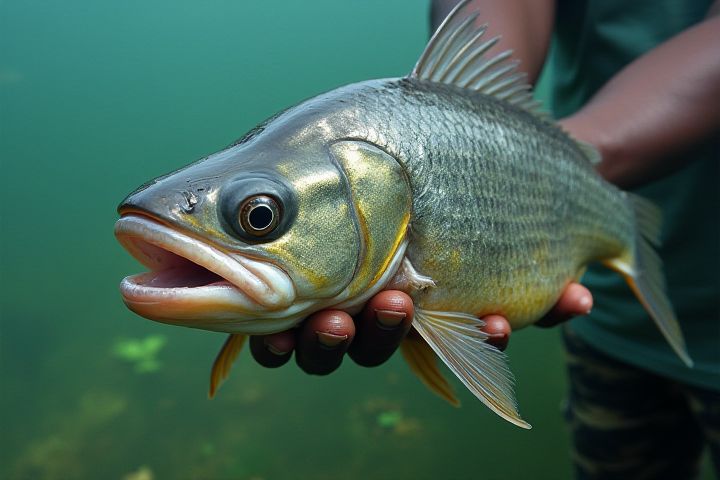
Fisheries and aquaculture in Nigeria play a crucial role in the nation's economy, contributing to food security and employment. The country has abundant water resources, including rivers, lakes, and coastal areas, which provide a diverse habitat for various fish species. Aquaculture practices have been gaining popularity, with major species such as catfish and tilapia being cultivated to meet the increasing demand for fish. Government initiatives aim to boost production, enhance sustainable practices, and improve the quality of fish farming through training and funding for local fishers. By investing in this sector, you can support the growth of Nigeria's agricultural landscape while promoting nutritional health in local communities.
Major contributor to Nigeria's economy.
Fisheries and aquaculture significantly enhance Nigeria's economy, providing employment and supporting local communities. The sector contributes over $1 billion annually to the nation's revenue, showcasing its importance in food security and poverty alleviation. With a diverse range of species, including catfish, tilapia, and shrimp, aquaculture practices are rapidly evolving, fostering sustainable methods and increasing production. As local demand for seafood rises, innovations in aquaculture techniques are essential for maximizing yield and ensuring the sector's growth.
Significant source of employment.
Fisheries and aquaculture in Nigeria serve as a vital source of employment, engaging millions of individuals directly and indirectly within the sector. The country's abundant water bodies, including rivers, lakes, and coastal areas, provide ideal conditions for diverse fish species, promoting sustainable practices that ensure food security. Aquaculture operations, such as fish farming, contribute significantly to the country's economy by increasing fish production and offering alternative livelihoods. Your participation in this sector can enhance your community's resilience and support local economic development.
Essential for food security and nutrition.
Fisheries and aquaculture in Nigeria play a vital role in enhancing food security and improving nutrition for the population. The country's extensive water bodies, including rivers, lakes, and the Atlantic Ocean, provide abundant opportunities for fish cultivation and harvesting. By prioritizing sustainable practices and local fish species cultivation, Nigeria aims to meet the growing demand for affordable protein sources. Engaging in these sectors can significantly reduce reliance on imported fish, thereby boosting the national economy.
Rich diversity of aquatic species.
Fisheries and aquaculture in Nigeria encompass a rich diversity of aquatic species, including freshwater and marine organisms that support both local communities and the economy. Key species include tilapia, catfish, and shrimp, which are pivotal for food security and employment opportunities. The sector contributes significantly to Nigeria's agricultural GDP, highlighting its importance in sustainable development and resource management. By promoting practices such as responsible fishing and aquaculture technologies, you can help ensure the longevity of these vital aquatic resources.
High demand for fish products.
Nigeria's fisheries and aquaculture sectors are thriving due to the increasing demand for fish products, which has become essential for both local consumption and export. With a vast coastline of over 800 kilometers and numerous inland water bodies, the country offers diverse aquatic habitats conducive to fish farming. Key species cultivated include catfish, tilapia, and croaker, catering to varied culinary preferences. Sustainable practices are crucial as they ensure the long-term viability of fish stocks while supporting the livelihoods of millions involved in this vital industry.
Challenges with overfishing.
Fisheries and aquaculture in Nigeria are critical for food security and economic development, yet they face severe challenges from overfishing, which depletes fish stocks and disrupts aquatic ecosystems. The rapid increase in fishing activity, driven by both local and commercial interests, has led to unsustainable practices that threaten biodiversity and the livelihoods of coastal communities. Governmental and non-governmental organizations are actively working to implement sustainable fishing regulations and promote aquaculture as a viable alternative to preserve marine resources. By adopting responsible fishing methods and supporting aquaculture initiatives, you can contribute to the long-term sustainability of Nigeria's fisheries sector.
Pollution affects aquatic habitats.
Pollution in Nigeria significantly impacts fisheries and aquaculture, threatening aquatic biodiversity and disrupting local livelihoods. Chemical runoff from agriculture, industrial waste, and plastic debris contaminate water bodies, leading to the decline of fish populations and the deterioration of their habitats. Furthermore, this environmental degradation can result in reduced fish stocks, ultimately affecting food security and economic stability for communities reliant on these resources. Sustainable practices and pollution control measures are essential to protect Nigeria's aquatic ecosystems and ensure the viability of its fisheries and aquaculture industries.
Potential for export growth.
Fisheries and aquaculture in Nigeria present significant opportunities for export growth, driven by the country's abundant water resources and diverse aquatic species. The sector benefits from a vast coastline, rivers, and lakes that support both marine and freshwater fisheries, allowing for the cultivation of high-demand species like catfish and tilapia. With a growing global appetite for seafood, Nigeria can leverage its production capabilities to enhance international trade, tapping into markets across Europe, Asia, and the Americas. Sustainable practices and technological advancements in aquaculture can further optimize yield and quality, ensuring that Nigerian fishery products meet export standards.
Government policy supports development.
Fisheries and aquaculture in Nigeria benefit significantly from government policies aimed at promoting sustainable development and food security. Initiatives such as the National Aquaculture Strategy aim to increase fish production, boost local employment, and enhance livelihoods. Regulatory frameworks are designed to ensure responsible fishing practices and protect aquatic ecosystems, fostering both economic growth and environmental stewardship. By aligning with global standards, Nigeria seeks to strengthen its position in the international seafood market while meeting the nutritional needs of its growing population.
Increasing adoption of modern aquaculture techniques.
Fisheries and aquaculture in Nigeria emphasize the integration of cutting-edge aquaculture technologies to boost production efficiency and sustainability. This modernization supports the cultivation of various fish species, improving local food security and economic growth. By adopting innovative practices such as recirculating aquaculture systems and biofloc technology, fish farmers can enhance yield and reduce environmental impacts. You can explore opportunities to participate in training programs that promote these advanced techniques, contributing to the sector's development.
